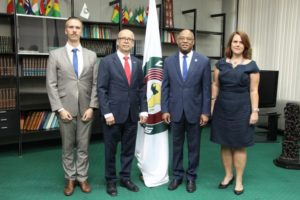 News
News
ECOWAS COURT TO DECIDE ON LOCUS OF NIGERIAN LAWYER…
The ECOWAS Court of Justice has fixed the 9th of May 2019 to hear the submissions of parties on the preliminary objection of the Defendant challenging the locus standi of a Nigerian lawyer, Mr. Femi Falana, to file a suit in which he challenged the competence of the Authority of Heads of State and Government of ECOWAS to reduce the number of judges of the Court from seven to five.
In suit number ECW/CCJ/APP/32/18 filed by Mr. Falana, a Senior Advocate of Nigeria (SAN) against the Authority of Heads of States and Government and the Council of Ministers, the lawyer averred that the 2017 decision of both defendants to reduce the number of judges of the ECOWAS Court was illegal as it contravened the provisions of Articles 3, 6 and 15 of the ECOWAS Revised Treaty and Article 3 of the Protocol on the Court among others.
He therefore urged the Court to declare that the defendants lacked the competence to reduce the number of judges, and that the decision reached to reduce the number of judges was illegal, null and void as it violated the provisions of the ECOWAS Revised Treaty and the Protocol of the ECOWAS Court of Justice. The plaintiff is also seeking an order of the Court to restrain the defendants or their agents from implementing/acting on the said decision.
The plaintiff, who was represented by Mr. Marshal Abubakar, further argued that the defendants did not amend the Protocol of the Court that created the composition of judges before reducing the number of judges and that the reduction has resulted in congestion of cases before the Court thereby affecting the right of the citizens to the speedy dispensation of justice.
In their statement of defence, the defendants represented by Mr. Frank Chude, Ms. Eve Olowofela, Mr. David Dada and Mr. Wilfred Achuke, raised a preliminary objection challenging the locus standi of the plaintiff to bring the action.
The second defendant, the Council of Ministers, had at its 78th Ordinary Session in June 2017 recommended the reduction of the number of judges of the ECOWAS Court from seven to five, which was confirmed and approved by the first defendant during its 51st Ordinary Session.
The matter will be deliberated by a panel of three judges comprising Justices Edward Amoako Asante, Dupe Atoki and Januaria Moreira Costa.
